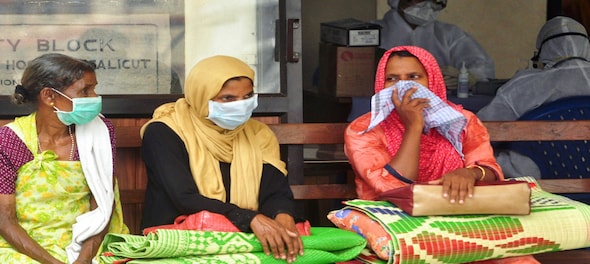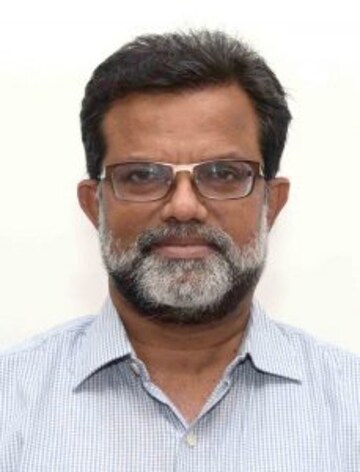
The outbreak of the deadly Nipah virus has claimed at least 13 deaths in Kerala, which boasts the best healthcare system in India. The ‘newness’ of Nipah — it was first identified in 1999, according to the World Health Organization — and the absence of a vaccine to combat the virus that can be transmitted to humans from animals and is hosted by fruit bats make the task of health officials daunting. Despite these challenges, the Kerala government has successfully managed to contain the virus, said health secretary Rajeev Sadanandan. This has been possible largely due to the robust healthcare system in Kerala, he told CNBC-TV18 in an exclusive interview by email.

What is the status with regard to the containment of the Nipah virus? Media reports say the spread of the virus has been contained but the death toll continues to rise.
We believe the epidemic has been contained. There has been only one foci, no animal infections and the first wave (persons who were infected by the original case) and we are awaiting the second wave (persons who have been infected by the persons who picked up the infection from the first case). Until now, we have not seen such a wave. But a few cases will come up until the June 4 — 16 days after the cases were picked up.
Our virus belongs to the Bangladeshi Genome, which is much for virulent than the Malaysian variety. Our death rate has been among the highest (only three survivors from 16 cases) but all of them have been detected late. The person who was detected early, Ubeesh, is doing well.
Please explain in detail how the Kerala government and your department responded to combat the virus.
Kerala's health response always leverages the awareness of our population and the depth of our health system. We maintained total transparency issuing periodic media bulletins and advising people who have had contact with positive cases to maintain house quarantine. This had a negative impact of ostracisation of the affected families. But it helped to prevent infection. Panchayats and elected representatives all played a very supportive role.
The media in Kerala, especially the print media, took over the task of educating the population and reassuring them. The health department prepared the list of contact cases, with the location and time of contact and assigned the field staff to visit these contacts, advise them house quarantine, and began tracking them. A Command Centre was set up with the top medical officer, Director of Health Services, being posted there permanently until the end of the episode. Data of admissions, sending of samples, results, deaths and discharges were collated and made available as daily bulletins. The cases were managed in the Kozhikode medical college. Personal protection equipment was distributed to health workers at all levels.
We contacted the best international experts in the field, including the Uniformed Services University of Health Sciences, WHO etc and discovered that the Queensland government had stockpiled a promising Human Monoclonal Antibody for compassionate use. Using our contacts, we contacted the Queensland government, and obtained the offer for 50 vials. Indian Council of Medical Research made the formal request to the government of Australia, the Drug Controlller General of India agreed to the use of an unpatented drug for compassionate use.
All of us need to have a robust surveillance system to pick up such diseases.
Did it help that Kerala has a robust healthcare system?
We picked up the case in time and prevented its spread only because of the health system.
Despite the existence of a robust healthcare system and an educated class of citizens, Kerala experiences a bout of diseases such as chikungunya, dengue, malaria etc every year. Please explain this paradox.
We have the problem of only dengue. All the other cases such as Filariasis, Malaria, TB and Leprosy are on the verge of elimination. We do have occasional cases of Leptospirosis and JE but the issue is not serious. Our problems are non-communicable diseases. Unlike other states, we are open about our epidemics. We believe that helps us manage the epidemic even though the national media goes to town on it. It is also a sign of our confidence that such bad press does not bother us too much.
What has been the impact of the Nipah virus on Kerala’s tourism economy? Media reports say there have been several cancellations of bookings for Kerala medical tourism tours.
To a tourist, any part of the state looks the same. So there were some cancellations. We issued a travel advisory listing four districts that people were advised to avoid. This may have hurt the tour operators, but it again is part of our policy of transparency.
What are the next steps the government will undertake to combat the virus?
Kerala will work with WHO and ICMR to develop drugs against Nipah. We will also carry out, with the help of the best experts from Asia, a surveillance of the fruit bat population in the state to assess the potential for recurrence.

Kerala Health Secretary Rajeev Sadanandan
What is the status with regard to the containment of the Nipah virus? Media reports say the spread of the virus has been contained but the death toll continues to rise.
We believe the epidemic has been contained. There has been only one foci, no animal infections and the first wave (persons who were infected by the original case) and we are awaiting the second wave (persons who have been infected by the persons who picked up the infection from the first case). Until now, we have not seen such a wave. But a few cases will come up until the June 4 — 16 days after the cases were picked up.
Our virus belongs to the Bangladeshi Genome, which is much for virulent than the Malaysian variety. Our death rate has been among the highest (only three survivors from 16 cases) but all of them have been detected late. The person who was detected early, Ubeesh, is doing well.
Please explain in detail how the Kerala government and your department responded to combat the virus.
Kerala's health response always leverages the awareness of our population and the depth of our health system. We maintained total transparency issuing periodic media bulletins and advising people who have had contact with positive cases to maintain house quarantine. This had a negative impact of ostracisation of the affected families. But it helped to prevent infection. Panchayats and elected representatives all played a very supportive role.
The media in Kerala, especially the print media, took over the task of educating the population and reassuring them. The health department prepared the list of contact cases, with the location and time of contact and assigned the field staff to visit these contacts, advise them house quarantine, and began tracking them. A Command Centre was set up with the top medical officer, Director of Health Services, being posted there permanently until the end of the episode. Data of admissions, sending of samples, results, deaths and discharges were collated and made available as daily bulletins. The cases were managed in the Kozhikode medical college. Personal protection equipment was distributed to health workers at all levels.
We contacted the best international experts in the field, including the Uniformed Services University of Health Sciences, WHO etc and discovered that the Queensland government had stockpiled a promising Human Monoclonal Antibody for compassionate use. Using our contacts, we contacted the Queensland government, and obtained the offer for 50 vials. Indian Council of Medical Research made the formal request to the government of Australia, the Drug Controlller General of India agreed to the use of an unpatented drug for compassionate use.
What lessons do you have to offer to the rest of the country when it comes to tackling such priority diseases?
All of us need to have a robust surveillance system to pick up such diseases.
Did it help that Kerala has a robust healthcare system?
We picked up the case in time and prevented its spread only because of the health system.
"Unlike other states, we are open about our epidemics. We believe that helps us manage the epidemic even though the national media goes to town on it. It is also a sign of our confidence that such bad press does not bother us too much.”
Despite the existence of a robust healthcare system and an educated class of citizens, Kerala experiences a bout of diseases such as chikungunya, dengue, malaria etc every year. Please explain this paradox.
We have the problem of only dengue. All the other cases such as Filariasis, Malaria, TB and Leprosy are on the verge of elimination. We do have occasional cases of Leptospirosis and JE but the issue is not serious. Our problems are non-communicable diseases. Unlike other states, we are open about our epidemics. We believe that helps us manage the epidemic even though the national media goes to town on it. It is also a sign of our confidence that such bad press does not bother us too much.
What has been the impact of the Nipah virus on Kerala’s tourism economy? Media reports say there have been several cancellations of bookings for Kerala medical tourism tours.
To a tourist, any part of the state looks the same. So there were some cancellations. We issued a travel advisory listing four districts that people were advised to avoid. This may have hurt the tour operators, but it again is part of our policy of transparency.
What are the next steps the government will undertake to combat the virus?
Kerala will work with WHO and ICMR to develop drugs against Nipah. We will also carry out, with the help of the best experts from Asia, a surveillance of the fruit bat population in the state to assess the potential for recurrence.
First Published: May 29, 2018 11:23 AM IST
Check out our in-depth Market Coverage, Business News & get real-time Stock Market Updates on CNBC-TV18. Also, Watch our channels CNBC-TV18, CNBC Awaaz and CNBC Bajar Live on-the-go!
